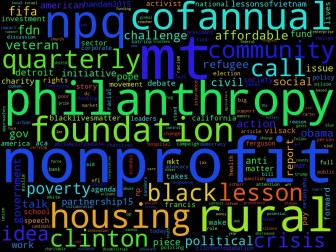Between those advocating for economic democracy who think there’s too much wealth and power concentrated in the hands of 1 percent of the nation’s population, and those advocating for corporate democracy advocated by nonprofits promoting investors’ rights through shareholder resolutions, and those advocating political campaigns that are free of secret special interests working under the cover of the Citizens United decision of the Supreme Court – is there a critical mass of public will TO DO SOMETHING?
Cleaning up campaign finance might be the big tent under which the majority of Americans who are dismayed at the fraying strands of American democracy could unite in common purpose. Will nonprofits stand outside of the tent or join the majority of Americans who think that the political system is increasingly corrupted by the equation of money and free speech and by the notion that secret corporate moneys through 501(c) entities is increasingly a component of that corruption? The big tent might be found in tapping the interests of corporate shareholders, to give them a voice in the political spending of the corporations in which they invest.
Some years ago, this author had an impromptu disagreement at an Aspen Institute convening with Elaine Chao about corporate philanthropic disclosure. A former President and CEO of the United Way of America, then Secretary of Labor under President George W. Bush (and, perhaps important in this instance, spouse of Senate Republican leader Mitch McConnell), Chao argued against legislation pending in Congress at that time (introduced by a Republican, by the way, and supported by the National Committee for Responsive Philanthropy) that would have required corporations to disclose their charitable giving. Most national nonprofit organizations such as Independent Sector opposed corporate disclosure, suggesting that disclosure would chill the willingness of corporations to make certain kinds of grants. Many Democrats opposed the legislation on the grounds that they would be willing to require corporate disclosure of charitable giving only if corporations also agreed to mandatory disclosure of their political expenditures, something that the Republicans wouldn’t accept. Chao’s argument was that corporate charitable giving was generally available and accessible in the documents that corporations file with the Securities and Exchange Commission (SEC). We don’t recall whether Chao suggested that the information might be lodged in a 10-Q or 10-K filing, two of the most commonly known submissions, or some other filing form, but Chao intimated that you simply needed to look to find the corporate giving.
Even if that were true, it would take one heck of an intrepid investigator to dig through a corporation’s SEC filings (accessible through the EDGAR system) as there are some 250 forms that publicly traded corporations might have to deposit with the SEC (this wouldn’t typically include, perhaps, much of the nation’s large, privately held corporations that aren’t required to file with the SEC, such as the largest, Cargill, the second largest, Koch Industries, the third largest, Mars, Inc., and other well-known corporate entities such as Publix supermarkets, PricewaterhouseCoopers, Bechtel, Ernst & Young, C&S wholesale grocers, Enterprise Rent-a-Car, Aramark, Toys ‘R Us, and Fidelity Investments). However, corporate SEC filings do not necessarily include information on corporate philanthropic giving, though sometimes nuggets can be unearthed. And corporate SEC filings do not disclose the secret political expenditures corporations are making to and through 501(c)(4) organizations pursuant to Supreme Court decisions such as Buckley v. Valeo and, more recently, Citizens United v. the Federal Election Commission.
The South Carolina presidential primary falls on the two-year anniversary of the Citizens United case that unleashed uncapped corporate spending on political ads, notes Ciara Torres-Spelliscy, an assistant professor of law at Stetson University College of Law. Two-thirds of S&P 500 corporations do not disclose their political spending, even to their own shareholders, much less the public at large, Torres-Spelliscy adds, highlighting how much of the corporate world is actively participating in the practice of secretly financing political campaign activities.
The result of Citizens United is that America’s richest and most powerful organizations are exercising unparalleled economic power to upend democratic processes in this country. It is no longer a dynamic of one-man, one-vote, but the voices of moneyed “persons” (and corporations are “persons” with protected free speech under Valeo and Citizens United) versus the voices of those with infinitesimally less capital at their disposal in the electoral process. And what is worse is that the moneyed interests get to keep their specific expenditures secret, in part by using nonprofit vehicles such as 501(c)(4) social welfare organizations. And maybe even worse than that, many leaders from the 501(c)(3) nonprofit side of the sector protect the notion of the confidentiality of (c)(4) funders.
Torres-Spelliscy suggests that in the wake of Congress’s failure to pass stronger disclosure requirements in federal election laws (the failure of the DISCLOSE Act), an alternative avenue might be to strengthen securities laws so that shareholders of publicly traded corporations would be informed and enabled to vote on corporate political spending. Wouldn’t it be great if Chao’s notion that it’s all there in corporations’ 10-Ks were true, and that shareholders could find out and actually vote on their corporations’ political expenditures?
Sign up for our free newsletters
Subscribe to NPQ's newsletters to have our top stories delivered directly to your inbox.
By signing up, you agree to our privacy policy and terms of use, and to receive messages from NPQ and our partners.
Stronger SEC reporting requirements probably won’t do any better than the DISCLOSE bill in Congress. But even if Congress doesn’t care about political democracy by requiring corporate political spending transparency, wouldn’t it want to give shareholders the right to express their opinions on the political expenditures of their corporate homes? Political spending disclosure is an increasing theme of shareholder resolutions, though resisted strongly by corporate executives. Why? As Torres-Spelliscy and others argue, corporate managers and shareholders frequently don’t agree about the political spending decisions of the higher-ups. Torres-Spelliscy argues, “There are twin problems when corporate managers decide to use corporate resources in politics. One is a lack of transparency and second is a lack of consent. There is no SEC rule requiring public companies to disclose their political spending to their investors. And the disclosure that is required by election laws is easily evaded. Because of this, shareholders cannot monitor how corporate managers are spending corporate assets on political causes.The second problem is that even when corporations are up front about their political spending, as a growing cohort of top companies are, there is no mechanism within the corporate structure for shareholders to consent or object to this spending. Shareholders are left with two unsatisfactory tools to respond to objectionable corporate political activity: selling their stock after the fact or trying in vain to vote out the board.”
Don’t think that it’s only rich shareholders we’re talking about. Millions of Americans invest in corporate America through their mutual funds. According to the 2011 Investment Company Fact Book, 51.6 million households (or over 90 million individuals) hold shares of mutual funds. A 2008 ICI study said that 54.5 million households, that is, 47 percent of all American households, owned corporate equities or bonds, though it is undoubtedly true that a much smaller number, perhaps 20 million or less, own individual shares. Make no mistake about stock ownership: in terms of value, the top 10 percent of U.S. households own 89.4 percent of stocks and mutual funds purchased directly and 81.2 percent of stocks and mutual funds owned through IRAs, Keough plans, 401(k)s, and other retirement investment vehicles. The lack of disclosure of corporate political spending to 501(c)(4)s and 501(c)(6)s means that rich investors and regular investors are without basic information they need and deserve to make informed decisions about where to put their money. Torres-Spelliscy references research suggesting that “corporate political spending endangers shareholder value,” referencing a study by economist Michael Hadani of the political spending of 1,110 firms over an eleven-year period that concluded that “PAC expenditures have a statistically significant negative affect on firms’ market value, both when examining their year to year PAC expenditures and also when examining their cumulative, 11 years, PAC expenditures.”
Since both Democrats and Republicans in the last Congress were unable to get behind the DISCLOSE legislation, even after an exemption or carve out was made to satisfy the National Rifle Association, it is hard to imagine Congress doing much to overturn Citizens United, especially as the nation staggers into an election year when “independent political committees” are carrying the weight of candidates’ political messages (witness the battles between the SuperPACs of candidates Mitt Romney, Newt Gingrich, Ron Paul, and Rick Santorum as the candidates themselves all claim to have no control over what their supporters do with their political expenditures). All the major presidential candidates, from Obama through Huntsman (except for Republican Buddy Roemer), have spurned the opportunity to take taxpayer-funded federal matching campaign funds this go-around—the first time ever—and probably in doing so revealing the collapse of the fig leaf of the system of public campaign financing devised after the Watergate scandals and turning U.S. elections over to moneyed interests hiding behind 501(c)(4) and 501(c)(6) confidentiality rules to attempt to buy elections.
There is already some disclosure of giving to Political Action Committees (PACs) and 527s as required by the Federal Election Commission. Through Mother Jones and the Center for Responsive Politics, we know that the big donors to PACs and 527s during this election cycle include Newt Gingrich’s longtime supporter Las Vegas Sands gambling magnate Sheldon Adelson (over $5 million), Texas homebuilder and “Swift Boat” attack ad funder Bob Perry ($3.25 million), Dreamworks Animation head and Obama bundler Jeffrey Katzenberg ($2 million), former Univision CEO Jerry Perenchio and his artist spouse Margaret ($2 million to Karl Rove’s American Crossroads PAC), Gold Gym owner Robert Rowling ($1 million to American Crossroads), and many others. We don’t know the secret supporters of groups that don’t have to report and disclose their donors to the FEC, particularly the secret corporations behind the political campaign activities of 501(c)(4) and 501(c)(6) organizations.
If as a result of Valeo and Citizens United, we cannot undo the Supreme Court’s green-lighting of unfettered corporate political expenditures, and if as a result of a feckless do-nothing Congress we cannot get the DISCLOSE legislation passed to strengthen the hand of the Federal Election Commission, then maybe the advocates of campaign finance reform, the advocates of shareholder rights, and the advocates of decreasing the concentration of wealth and power controlled by the top 1 percent can unite to require corporate disclosure of political spending for the tens of millions of households who own corporate stock through mutual funds, IRAs, and 401(k)s as a matter of allowing investors to maximize the value and benefit of their ownership of corporate stock. Corporations have to disclose much to their shareholders in the arcane mix of documents and reports they provide to the Securities and Exchange Commission. Doesn’t it make sense for shareholders to have access to information about how much their corporations are spending on political campaigns the same way they can learn about corporate spending on travel, executive salaries, and commercial advertising?
The nonprofit sector—the nonprofit wing of the nonprofit sector represented by 501(c)(3) public charities—has its roots in the small “d” democracy of this nation. Removing the cloak of secrecy from corporate political spending through 501(c) entities ought to be a top priority for nonprofits that still cling to their democratic roots and values.













